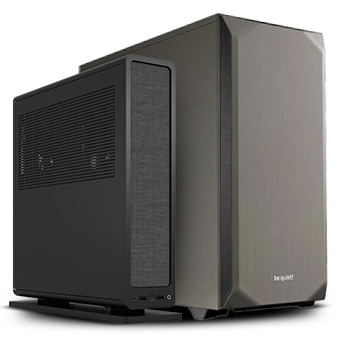Should I Buy an i5 or i7 for Gaming?
Posted on 10:24am, Wednesday 4th May, 2023

Choosing the best CPU is a critical decision for gamers seeking optimal performance and immersive experiences. When it comes to Intel processors, the next-gen Intel Core i5 and Intel Core i7 lines stand out as popular choices, each offering distinct advantages. Understanding the differences between these options is crucial for making an informed decision that aligns with individual gaming needs.
While both processors boast impressive capabilities, their varying specifications can significantly impact gaming performance. From the number of cores and hyperthreading to speed, caching ability, and power consumption, every aspect plays a role in delivering smooth gameplay and enhanced visuals. Here, we are going to delve into the intricacies of the i5 and i7 processors, unravel their disparities, and provide valuable insights to help gamers make the right choice for their gaming rigs.
What Is the Difference Between an i5 and an i7 Processor?
When it comes to choosing between an i5 and an Intel Core i7 processor, understanding their basic specifications and features is essential. Both processor lines are part of Intel's Core series and offer powerful performance for gaming. The i5 processors typically feature quad-core configurations without hyper-threading, whereas core i7 processors often have higher core counts and support hyper-threading. This means that an i7 Intel processor can handle more simultaneous threads, allowing for better multitasking capabilities.
In terms of performance, i7 processors generally offer higher clock speeds and larger cache sizes compared to i5 processors. This translates into faster processing speeds and improved responsiveness in demanding gaming scenarios. Additionally, i7 processors often come with higher thermal design power (TDP) ratings, which means they can handle heavier workloads and maintain stable performance over longer periods.
While both i5 and i7 processors can deliver excellent gaming performance, the additional cores and hyper-threading capabilities of the i7 processors provide a performance advantage in tasks that benefit from parallel processing, such as video editing or streaming alongside gaming. Therefore, the choice between an i5 and an i7 processor depends on the specific gaming requirements and budget constraints of the individual.
What Is the Difference Between Cores and Hyper-threads in the i5 and i7?

To truly understand the distinctions between i5 and i7 processors, it's crucial to grasp the concepts of CPU cores and hyper-threading and their impact on performance. CPU cores serve as the processing units within a processor, responsible for executing tasks and calculations. The more cores a processor has, the more tasks it can handle simultaneously, leading to improved performance and smoother multitasking.
Hyper-threading, on the other hand, is Intel's technology that enhances multitasking capabilities by allowing each CPU core to handle multiple threads simultaneously. This means that a processor with hyper-threading can handle more tasks in parallel, leading to increased efficiency and faster overall performance.
Considering core and hyper thread count, i5 processors typically feature fewer cores compared to their i7 counterparts. i5 processors commonly have four cores without hyper-threading, while i7 processors often come with six or eight cores and support hyper-threading, effectively doubling the number of threads they can handle.
The additional cores and hyper threads in i7 processors provide a significant advantage in tasks that benefit from parallel processing, such as content creation, video editing, or running resource-intensive applications alongside gaming. However, for gamers primarily focused on gaming performance without heavy multitasking needs, i5 processors can still offer excellent gaming experiences at a more affordable price point.
What Is the Difference in Speed?
The speed of a processor plays a crucial role in determining its overall performance. Clock speed, measured in gigahertz (GHz), represents the number of cycles a processor can execute per second. A higher clock speed generally results in faster processing and improved performance.
Both i5 and i7 processors feature base clock speeds, which represent their default operating frequency. However, Intel's Turbo Boost technology further enhances performance by dynamically increasing the clock speed when needed, based on the workload and temperature conditions. This allows the processor to deliver an extra boost of power during demanding tasks or gaming sessions, ensuring a smooth and responsive experience.
In relation to maximum achievable speeds, i7 processors often have higher clock speeds compared to i5 processors. This means that they can handle computations and instructions at a faster rate, resulting in quicker response times and smoother game-play. However, it's important to note that the actual maximum speed achieved depends on various factors, including workload, cooling, and power constraints.
While i7 processors may offer higher clock speeds and potentially better performance, the difference in speed alone may not be the sole determining factor for gaming performance. Other aspects, such as graphics cards, memory, and overall system configuration, also play significant roles in achieving optimal gaming experiences.
Which Has the Best Caching Ability?
CPU cache plays a crucial role in improving processor performance by providing faster access to frequently used data. It acts as a temporary storage area for instructions and data that the processor needs to access quickly. A larger cache size allows the processor to store more data closer to the cores, reducing latency and improving overall efficiency.
When comparing i5 and i7 processors, there are differences in cache sizes and levels. Generally, i7 processors tend to have larger caches compared to i5 processors. This means that i7 processors can store more data in the cache, resulting in faster retrieval times and reduced bottlenecks during gaming or resource-intensive tasks.
The positive impact of larger caches on gaming performance is significant. With a larger cache, the processor can quickly access game-related data, such as textures, models, and game logic, leading to reduced loading times, smoother gameplay, and improved frame rates. However, it's important to note that caching is just one factor among many that contribute to overall gaming performance, and a larger cache alone does not guarantee optimal gaming experiences.
Which One of Them Has the Best Power Consumption?
Power consumption is an important consideration when choosing between i5 and i7 processors for a gaming PC. Efficient power usage not only helps reduce energy costs but also plays a role in system temperature and overall stability. When comparing i5 and i7 processors, the power requirements and efficiency can vary. Generally, i5 processors tend to have lower power consumption compared to i7 processors. This means that i5 processors are more power-efficient and generate less heat during operation.
Power consumption directly affects system temperature, as higher power draw results in increased heat production. Proper cooling becomes crucial for maintaining stable performance and preventing thermal throttling or system instability. By opting for an i5 processor with lower power consumption, gamers can achieve a balance between performance and temperature, ensuring a cooler and more stable gaming experience. Considering power consumption helps not only in reducing energy bills but also in building a system that runs efficiently and reliably, providing an optimal gaming environment.
Does i7 Get More FPS Than i5?
The frame rate, measured in FPS (frames per second), is a crucial factor in determining the smoothness and fluidity of gaming experiences. However, the FPS achieved is dependent on various factors beyond just the CPU. While the CPU does play a role in gaming performance and FPS, it is not the sole determinant. Factors like the graphics card, memory, game optimization, and entire system configuration also significantly impact FPS.
When comparing an i5 and an i7 CPU side by side, the latter generally offers higher performance due to its higher clock speeds, additional cores, and hyper-threading capabilities. In certain scenarios where games or tasks heavily rely on CPU performance, the i7 processor may provide a noticeable FPS advantage over an i5.
Benchmark tests and examples often highlight the performance differences between i5 and i7 processors in various gaming scenarios, helping users make informed decisions based on their specific gaming needs and budget constraints.
Which CPU should I buy?
Should I buy an i5 or i7 for gaming? When considering whether to buy an i5 or i7 processor for gaming, it's crucial to evaluate your budget and specific gaming needs. By taking these factors into account, you can make an informed decision that maximizes performance and suits your requirements.
For gamers with a limited budget or those who prioritize gaming performance without extensive multitasking, an i5 processor is a viable choice. i5 processors offer excellent gaming performance at a more affordable price point, making them a popular option among budget-conscious gamers.
However, if you engage in resource-intensive tasks such as content creation, video editing, or streaming while gaming, an i7 processor becomes more appealing. With its additional cores, hyper-threading, and higher clock speeds, an i7 processor excels in multitasking scenarios and provides a noticeable performance boost for demanding applications.
The decision between an i5 and i7 processor depends on your gaming needs and budget. If gaming is your primary focus and you're looking for a cost-effective solution, an i5 processor will suffice. However, if you require the best possible gaming performance combined with multitasking capabilities, investing in an i7 processor is recommended. Considering your specific requirements and weighing the differences between i5 and i7 processors will enable you to make the right CPU choice, ensuring an optimal gaming experience tailored to your needs.
Key Takeaways
If you're still wondering which CPU to buy, choosing between an i5 and i7 processor for gaming involves understanding the key differences and considering individual requirements. Throughout, we explored the disparities in specifications, cores, hyper-threading, speed, caching ability, power consumption, and gaming performance.
It is crucial to recognize that while i7 processors generally offer better performance, the decision ultimately depends on budget and specific gaming needs. For gamers on a budget or focused primarily on gaming, an i5 processor can provide an excellent experience. However, if multitasking and resource-intensive tasks are a priority, investing in an i7 processor would be beneficial.
To make the best decision, it's essential to assess your gaming requirements and budget constraints. Understanding the distinctions between i5 and i7 processors empowers you to select the CPU that aligns with your needs, ensuring an optimal gaming experience tailored to you.






